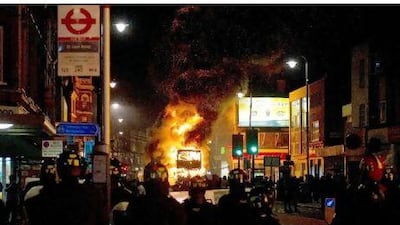LONDON // British politicians yesterday condemned riots that injured 26 police officers on Saturday night while residents in the north London area of Tottenham are wondering if they will have to endure more violence this summer.
The riots started after an initially peaceful demonstration outside Tottenham police station to protest against the shooting death by police of a young man on Thursday. Residents blamed youths from outside Tottenham for turning the protest into the worst rioting since 1985, when a police officer was stabbed to death and nearly 60 others were hospitalised.
"There is no justification for the aggression the police and the public faced or for the damage to property," said a spokesman for David Cameron, the Conservative prime minister. "There is now a police investigation into the rioting and we should let that process happen."
The Conservative-Liberal Democrat coalition government is overseeing some of the harshest austerity measures since those imposed by the government led by Margaret Thatcher in the 1980s.
In pictures: London riot
Photos from the north London area of Tottenham riot
While public disorder in Britain has not matched the levels in Greece, violence did mar student demonstrations last December. In March, London's West End endured looting and vandalism amid protests against alleged "tax-dodging" large retailers.
Yesterday morning, police cordoned off Tottenham High Road as smoke continued to rise from smouldering buildings set alight on Saturday night. About 200 people attacked police with petrol bombs and bottles, burning two police cars and a bus. Police arrested at least 42 people on charges including violent disorder, burglary and theft.
Speaking at the scene, David Lammy, the Labour member of parliament for Tottenham, was heckled and booed.
As he spoke, a member of the public shouted out: "Why does the place have to burn down before we have a discussion about all this?"
The diversity in Tottenham and nearby Wood Green include the Caribbean, Africa and the sub-continent. There is also a sizeable community of Orthodox Jews from eastern Europe.
Youths of Afro-Caribbean descent say they feel discriminated against by the police. Marlon, a 29-year-old administrator who did not want to reveal his surname, said while he often felt targeted by police, the different ethnic groups of Tottenham live together peacefully.
"The police can be very aggressive and treat us all like hooligans," he said. "But we live here peacefully and it was a minority who caused all the trouble."
The Metropolitan Police, whose chief recently stepped down after questions were raised about the force's handling of investigations into wrongdoing by Rupert Murdoch's media group, said it would investigate the rioting.
An independent police complaints commission is also looking into Thursday's shooting of 29-year-old Mark Duggan, a father of four, who was killed after police stopped the minicab he was driving in.
Adrian Hanstock, a police commander, said the force had not anticipated trouble following the vigil by Duggan's family. He defended the response, saying there was "no indication that the protest would deteriorate into the levels of criminal and violent disorder that we saw.
"We believe that certain elements, who were not involved with the vigil, took the opportunity to commit disorder and physically attack police officers, verbally abuse fire brigade personnel and destroy vehicles and buildings," he said.
Much effort was invested to repair community relations in the years after the 1985 riots, but Tottenham remains poor with high rates of joblessness. An article in last Friday's Guardian newspaper described how many experts predicted a rise in crime because budget cuts were leading to the loss of facilities that had kept many inner-city youths occupied.
"Services are not just being taken away from young people, they are being taken from poor young people," John Pitts, a professor who has researched gang behaviour for more than 40 years, told The Guardian.
"At a simple level, that could mean an increase in antisocial behaviour and vandalism. In the longer term, if you withdraw state protection then there will be ever greater reliance on the groupings that emerge in that vacuum."
Mustafa, a Turkish-Cypriot who has lived in Tottenham for more than 20 years, could barely contain his anger after listening to Mr Lammy. "The rich people, with their houses and two cars, they don't care what happens to us and neither does Lammy," he said.
He described how he had recently sold his kebab shop because of poor business and was forced to apply for unemployment benefits for the first time in his life.
"They treated me like a dog, putting their feet up on the desk as they spoke to me," he said. "If people feel they have nothing to lose, they have no rights, no power, then this [the riots] is what happens. And it could happen again."
sdevi@thenational.ae

